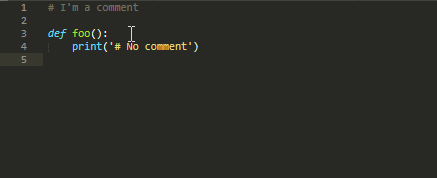I’ve been trying to figure out for days how extract_scope works behind the curtains but I can produly say I’ve failed miserably, I’ve prepared a puzzle in case any smart guy from the forums wanted to enlight us:
import os
table = [
[0, '#', (0, 16), "# I'm a comment\n", "source.python comment.line.number-sign.python punctuation.definition.comment.python "],
[1, ' ', (0, 16), "# I'm a comment\n", "source.python comment.line.number-sign.python "],
[2, 'I', (0, 16), "# I'm a comment\n", "source.python comment.line.number-sign.python "],
[3, "'", (0, 16), "# I'm a comment\n", "source.python comment.line.number-sign.python "],
[4, 'm', (0, 16), "# I'm a comment\n", "source.python comment.line.number-sign.python "],
[5, ' ', (0, 16), "# I'm a comment\n", "source.python comment.line.number-sign.python "],
[6, 'a', (0, 16), "# I'm a comment\n", "source.python comment.line.number-sign.python "],
[7, ' ', (0, 16), "# I'm a comment\n", "source.python comment.line.number-sign.python "],
[8, 'c', (0, 16), "# I'm a comment\n", "source.python comment.line.number-sign.python "],
[9, 'o', (0, 16), "# I'm a comment\n", "source.python comment.line.number-sign.python "],
[10, 'm', (0, 16), "# I'm a comment\n", "source.python comment.line.number-sign.python "],
[11, 'm', (0, 16), "# I'm a comment\n", "source.python comment.line.number-sign.python "],
[12, 'e', (0, 16), "# I'm a comment\n", "source.python comment.line.number-sign.python "],
[13, 'n', (0, 16), "# I'm a comment\n", "source.python comment.line.number-sign.python "],
[14, 't', (0, 16), "# I'm a comment\n", "source.python comment.line.number-sign.python "],
[15, '\n', (0, 16), "# I'm a comment\n", "source.python comment.line.number-sign.python "],
[16, '\n', (0, 54), "# I'm a comment\n\ndef foo():\n print('# No comment')\n", "source.python "],
[17, 'd', (17, 24), 'def foo', "source.python meta.function.python storage.type.function.python "],
[18, 'e', (17, 24), 'def foo', "source.python meta.function.python storage.type.function.python "],
[19, 'f', (17, 24), 'def foo', "source.python meta.function.python storage.type.function.python "],
[20, ' ', (17, 24), 'def foo', "source.python meta.function.python "],
[21, 'f', (17, 24), 'def foo', "source.python meta.function.python entity.name.function.python meta.generic-name.python "],
[22, 'o', (17, 24), 'def foo', "source.python meta.function.python entity.name.function.python meta.generic-name.python "],
[23, 'o', (17, 24), 'def foo', "source.python meta.function.python entity.name.function.python meta.generic-name.python "],
[24, '(', (24, 26), '()', "source.python meta.function.parameters.python punctuation.section.parameters.begin.python "],
[25, ')', (24, 26), '()', "source.python meta.function.parameters.python punctuation.section.parameters.end.python "],
[26, ':', (25, 27), '):', "source.python meta.function.python punctuation.section.function.begin.python "],
[27, '\n', (0, 54), "# I'm a comment\n\ndef foo():\n print('# No comment')\n", "source.python "],
[28, ' ', (0, 54), "# I'm a comment\n\ndef foo():\n print('# No comment')\n", "source.python "],
[29, ' ', (0, 54), "# I'm a comment\n\ndef foo():\n print('# No comment')\n", "source.python "],
[30, ' ', (0, 54), "# I'm a comment\n\ndef foo():\n print('# No comment')\n", "source.python "],
[31, ' ', (0, 54), "# I'm a comment\n\ndef foo():\n print('# No comment')\n", "source.python "],
[32, 'p', (32, 38), 'print(', "source.python meta.function-call.python meta.qualified-name.python support.function.builtin.python "],
[33, 'r', (32, 38), 'print(', "source.python meta.function-call.python meta.qualified-name.python support.function.builtin.python "],
[34, 'i', (32, 38), 'print(', "source.python meta.function-call.python meta.qualified-name.python support.function.builtin.python "],
[35, 'n', (32, 38), 'print(', "source.python meta.function-call.python meta.qualified-name.python support.function.builtin.python "],
[36, 't', (32, 38), 'print(', "source.python meta.function-call.python meta.qualified-name.python support.function.builtin.python "],
[37, '(', (37, 38), '(', "source.python meta.function-call.python punctuation.section.arguments.begin.python "],
[38, "'", (38, 52), "'# No comment'", "source.python meta.function-call.python meta.function-call.arguments.python meta.string.python string.quoted.single.python punctuation.definition.string.begin.python "],
[39, '#', (38, 52), "'# No comment'", "source.python meta.function-call.python meta.function-call.arguments.python meta.string.python string.quoted.single.python "],
[40, ' ', (38, 52), "'# No comment'", "source.python meta.function-call.python meta.function-call.arguments.python meta.string.python string.quoted.single.python "],
[41, 'N', (38, 52), "'# No comment'", "source.python meta.function-call.python meta.function-call.arguments.python meta.string.python string.quoted.single.python "],
[42, 'o', (38, 52), "'# No comment'", "source.python meta.function-call.python meta.function-call.arguments.python meta.string.python string.quoted.single.python "],
[43, ' ', (38, 52), "'# No comment'", "source.python meta.function-call.python meta.function-call.arguments.python meta.string.python string.quoted.single.python "],
[44, 'c', (38, 52), "'# No comment'", "source.python meta.function-call.python meta.function-call.arguments.python meta.string.python string.quoted.single.python "],
[45, 'o', (38, 52), "'# No comment'", "source.python meta.function-call.python meta.function-call.arguments.python meta.string.python string.quoted.single.python "],
[46, 'm', (38, 52), "'# No comment'", "source.python meta.function-call.python meta.function-call.arguments.python meta.string.python string.quoted.single.python "],
[47, 'm', (38, 52), "'# No comment'", "source.python meta.function-call.python meta.function-call.arguments.python meta.string.python string.quoted.single.python "],
[48, 'e', (38, 52), "'# No comment'", "source.python meta.function-call.python meta.function-call.arguments.python meta.string.python string.quoted.single.python "],
[49, 'n', (38, 52), "'# No comment'", "source.python meta.function-call.python meta.function-call.arguments.python meta.string.python string.quoted.single.python "],
[50, 't', (38, 52), "'# No comment'", "source.python meta.function-call.python meta.function-call.arguments.python meta.string.python string.quoted.single.python "],
[51, "'", (38, 52), "'# No comment'", "source.python meta.function-call.python meta.function-call.arguments.python meta.string.python string.quoted.single.python punctuation.definition.string.end.python "],
[52, ')', (51, 53), "')", "source.python meta.function-call.python punctuation.section.arguments.end.python "],
[53, '\n', (0, 54), "# I'm a comment\n\ndef foo():\n print('# No comment')\n", "source.python "],
]
def extract_scope(scopes, i):
length = len(scopes)
base = scopes[i]
# a
b = i
for s2 in scopes[i + 1::1]:
s1 = min([base, s2], key=len)
s2 = max([base, s2], key=len)
if not s2.startswith(s1):
break
b += 1
# b
a = i
for s2 in scopes[i - 1::-1]:
s1 = min([base, s2], key=len)
s2 = max([base, s2], key=len)
if not s2.startswith(s1):
break
a -= 1
return (max(0, a), min(b, length))
def extract_regions(data):
lst = [list(map(operator.itemgetter(1), g)) for k, g in groupby(enumerate(data), lambda v:v[0] - v[1])]
return [(v[0], v[-1]) for v in lst]
def test():
from collections import defaultdict
import json
import operator
from itertools import groupby
scopes = [v[4] for v in table]
scopes_positions = defaultdict(list)
for i, v in enumerate(table):
scopes_positions[v[4]].append(i)
regions = {}
lst = []
for k, v in scopes_positions.items():
for r in extract_regions(v):
regions[r] = k
lst.append(r)
lst = sorted(lst)
for v in lst:
print(v, regions[v])
if __name__ == '__main__':
scopes = [v[4] for v in table]
for i, v in enumerate(table):
r1 = v[2]
r2 = extract_scope(scopes, i)
print("{:<5}{:<10}{:<10}{}".format(
i, f"({r1[0]},{r1[1]})", f"({r2[0]},{r2[1]})", "OK" if r1 == r2 else "FAILED"
))
The goal of this puzzle is to tweak extract_scope function so it’ll get a similar behaviour than sublime’s original one.
Thanks in advance 
Ps. If you wonder how I’ve got the original table data, I’ve used this command:
class TestScopeCommand(sublime_plugin.TextCommand):
def run(self, edit, block=False):
print('-' * 80)
view = self.view
for i in range(view.size()):
a = i
b = repr(view.substr(i))
c = view.extract_scope(i)
d = repr(view.substr(view.extract_scope(i)))
e = view.scope_name(i)
print("{:<5}{:<5}{:<10}{:<65}{}".format(a,b,c,d,e))
on top of this file:
# I'm a comment
def foo():
print('# No comment')
 . Problem is I’m too dumb to reverse engineer the logic of it by myself hehe
. Problem is I’m too dumb to reverse engineer the logic of it by myself hehe 
